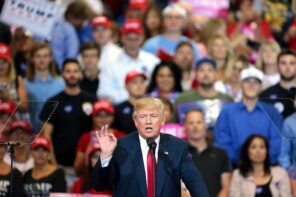Attorneys representing the administration of President Donald Trump already have their hands full—especially after the Ninth Circuit on Thursday unanimously rejected the Justice Department’s request to reinstate the “Muslim Ban.” But that isn’t the only legal challenge looming for DOJ attorneys tasked with defending the president’s sweeping order.
The American Civil Liberties Union on Tuesday filed a federal lawsuit contending that the president’s executive order violates the Religious Freedom Restoration Act (RFRA) and the First Amendment’s prohibition of a government establishment of religion. RD spoke with ACLU senior staff attorney Heather Weaver to better understand what makes this lawsuit different from the others already challenging the policy.
Weaver says the executive order’s targeting of Muslims is so blatant that it’s nearly unprecedented. While the text neither includes Trump’s pet phrase, “radical Islamic terrorism,” nor the words “Islam” or “Muslim,” it doesn’t have to. The administration “constructed the terms of the executive order” to disproportionately impact Muslim immigrants and refugees, Weaver explains.
“The executive order is religiously gerrymandered to target Muslims,” she says. It most directly harms Muslim-Americans who were born or have family in any of the seven nations from which U.S. entry is now prohibited under the president’s order. Most of the individual plaintiffs fall into this category, while others are naturalized American citizens or permanent residents who had permission to travel or approved family visas from one of the seven countries targeted. The actual harm facing these plaintiffs is particularly acute, the ACLU’s suit contends.
In policy and practice, the executive order essentially conditions immigration decisions and benefits on an immigrant’s faith, Weaver explains. “It’s limiting [rights available to Muslim Americans and immigrants] because of their faith, and we would say that that is a burden on their faith,” she says. “Because essentially what it boils down to is: it’s pressuring them to abandon their faith so that they may obtain the benefits that they’re seeking.”
“Whether it’s refugee status, or a green card, or some sort of other adjustment to their status,” the order limits the relief an individual or family can access based on their religion, Weaver says. “That’s what the burden is here, and of course under the Religious Freedom Restoration Act, if you’re going to impose that type of burden on somebody’s religious exercise, you have to have a compelling reason to do it, and it has to be the least restrictive means. That’s a very high standard for the government to meet, as we’ve seen in some cases. And I think the government hasn’t met that standard here, and I don’t think they can meet that standard.”
The ACLU’s complaint methodically documents the historical context leading up to the order’s implementation, including the numerous times then-candidate Trump stated his desire to ban Muslims from entering the U.S., and his recent on-camera admission that the order was intended to privilege Christians.
“The federal government is essentially sending a message, not only that Islam and Muslims are disfavored, but it’s suggesting that they’re evil, or wish to do others harm,” says Weaver. “So whatever the message that the executive order conveys is, that is informed by everything that has led up to that executive order.”
But that’s not the only religious freedom complaint advanced in the suit, filed February 7th in U.S. District Court of Maryland. Among the plaintiffs are two faith-based organizations that work to resettle and support refugees, allowing these plaintiffs to claim a unique injury: that the order substantially burdens the free religious exercise of these U.S.-based nonprofits, which consider the work they do an extension of their sincerely held religious beliefs. The International Refugee Assistance Project (IRAP) and Jewish international refugee resettlement organization (HIAS) both contend that the executive order prevents them from living out their faith on several fronts—a pointed, if indirect, rebuke to the administration’s purported advocacy of “religious freedom” for all.
The order betrays a fundamental misunderstanding of the concept of religious freedom as it functions in American society, Weaver says. She points to the multilayered irony that during the campaign Vice President Mike Pence condemned Trump’s proposed ban on Muslims, and has his own reputation of using “religious freedom” as an excuse for state-sanctioned anti-LGBT discrimination.
Calls to ban Muslims from entering the U.S. are offensive and unconstitutional.
— Governor Mike Pence (@GovPenceIN) December 8, 2015
According to the ACLU, “religious freedom does not include the ability to harm others,” says Weaver. “And that’s an important line to draw in this sand, and I think that that’s a boundary that’s been missing from Vice President Pence’s understanding of religious liberty. … It’s religious freedom ‘for me’ but not ‘for thee.'”
Weaver says this fundamental misunderstanding appears to be genuine, but that doesn’t absolve the nation’s most powerful politicians from being held responsible for the harm done by this limited perspective.
“When that’s your understanding of religious freedom, you don’t necessarily see it as hypocritical to be voted into office on that platform, and then one of your first acts is to target a religious minority,” says Weaver. “It is hypocritical—but I don’t that they think it’s hypocritical, to be clear.”





